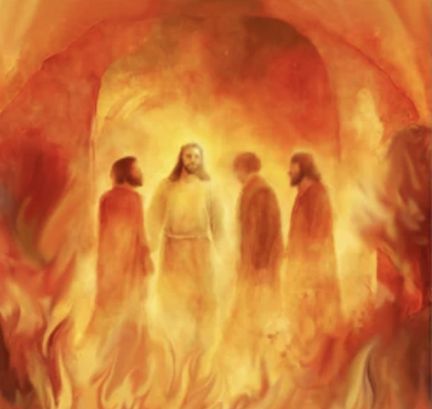Third Man Syndrome
I was led to the stairs. I don't think something grabbed my hand, but I was definitely led. There was still danger, so it led me to the stairwell, led me to break through, led me to run through the fire... There was obviously somebody encouraging me. That’s not where you go, you don’t go toward the fire.
On 9-11, when a plane struck the South Tower of the World Trade Center, Ron DiFrancesco found himself trapped inside. Confused and fearing for his life, he first headed toward the roof. But panic and second thoughts prevailed, so he decided to turn around and go down — only to find his path blocked by a wall of fire and smoke.
Fearing he'd made the wrong decision, he sensed an unseen presence beside him, and then heard a voice forcefully directing him to "Get up!" and push through the flames. The presence stayed near, guiding and directing him until he was in the clear and able to exit the doomed tower. He was the last person to escape before the South Tower collapsed.
DiFrancesco is not alone in this seemingly inexplcable experience. Countless others, in similar situations of extreme duress, have reported an unseen presence taking the reins to guide them to safety, comforting, calming, and encouraging all along the way.
Think Shadrach, Meshach, and Abednego in the Firey Furnace.

What DiFrancesco described in his harrowing escape is known as Third Man Syndrome —also known as the Third Man Factor — a fascinating psychological phenomenon where people in extreme, often life-threatening situations report sensing an unseen presence that offers comfort, guidance, or even lifesaving direction.
The term "Third Man Syndrome" comes from a haunting line in T.S. Eliot’s 1922 poem The Waste Land, which was inspired by explorer Ernest Shackleton’s account of his Antarctic expedition. Shackleton described feeling a mysterious presence guiding him and his crew during a grueling trek across South Georgia Island, saying it seemed “we were four, not three.” This invisible companion—neither seen nor heard—felt real enough to offer comfort and direction.
From Elliott's poem:
Who is the third who walks always beside you?
When I count, there are only you and I together
But when I look ahead up the white road
There is always another one walking beside you
Gliding wrapt in a brown mantle, hooded
I do not know whether a man or a woman —
But who is that on the other side of you?
Whether the multitude of historical accounts are merely psycological foolery, or miraculous meddling, who can say.
But on a spiritual level, those who us who know God in a personal and eternal way are blessed to have this assurance:
"And I will ask the Father, and he will give you another Helper, to be with you forever, even the Spirit of truth, whom the world cannot receive, because it neither sees him nor knows him. You know him, for he dwells with you and will be in you" (John 14:16-17, ESV).
In this way, Jesus will never leave us or forsake us. As far as we are concerned, there is always a "Third Man" in the fire! Train and tune your heart to hear Him!
"My sheep hear my voice, and I know them, and they follow me" (John 10:27, ESV).
The Dependable River of Life
The once-mighty Mississippi River is in crisis.

In recent years, the Mississippi River has experienced severe, months-long droughts that take hold across a vast swathe of America’s Midwest and South, regularly leaving the river at historic lows.
Forty percent of the continental United States drains into the river. The Mississippi River is far more than just a storied body of water. It is America’s superhighway. Ninety-two percent of all U.S. agricultural exports and 78 percent of the globe’s exported feed grain are transported on the river. From freshly harvested corn shipped all over the world to coffee that’s served in cafes across the Midwest, nearly 500 million tons of goods are shipped up and down the river every year. But today, the growing frequency of droughts is forcing barges to carry fewer goods.
Just a one-foot fall in water level shaves 100,000 bushels of soybeans from a typical 15-barge tow. That’s the equivalent of 2,738 metric tons—enough to overflow an Olympic-sized swimming pool.
A low Mississippi River is not only bad news for Americans, but also for countries as far away as China, Japan, and Indonesia where Midwestern grain and soybeans are essential food sources. In 2022, the low river levels resulted in an estimated $20 billion in lost trade.
Something dependable, some of us might even say almost eternal, is in danger of no longer being dependable.
Thankfully, we serve One whose power and provision flows dependably, eternally. He is, Himself, the Living Water — the source of all life.
"There is a river whose streams make glad the city of God, the holy habitation of the Most High" (Psalm 46:4, ESV).
"Then the angel showed me the river of the water of life, bright as crystal, flowing from the throne of God and of the Lamb" (Revelation 22:1, ESV).
Goodness and mercy will NOT follow me!
Anyone who's ever had a new puppy knows that sound of tiny paw pads following around behind you everywhere you go. You learn to instinctinctively look all around at your feet before taking a step, lest you trample the poor pup underfoot. Little puppies faithfulfully, playfully, and expectantly follow their humans around everywhere they go.

This image of the playful puppy serves as the perfect illustration of the promise of the Psalmist, "Surely goodness and mercy will follow me all the days of my life ..."
Or does it?!
As one Bible student, Elizabeth Petrone Wheeler, has so aptly expressed:
What an inappropriate translation for Psalm 23! The [Hebrew] word for 'follow' is the same word used [concerning] Pharaoh's actions ... after he had let the Israelites leave. Did Pharaoh 'follow' them? No, he pursued them; he wanted them back! The same word is used when Saul was looking for David. Was Saul 'following' David? No, he hunted him down! This word is used many times when a person or group is chasing after another, even for revenge or destruction, and it is never translated as 'follow' except in Psalm 23.
Perhaps the translators were trying to soften or cast new light on the meaning of a word so typically used in a negative context. Or perhaps they just don't appreciate the full force of the word. The Hebrew word translated 'follow' here in Psalm 23:6 literally means to persue or chase. See Strong's rendering, 7291.
Wheeler continues:
Make no mistake: the goodness of God is not following you like a puppy waiting to be noticed, it is pursuing you, chasing you down, hunting you, urging you to notice it. The passion with which a man will hunt his enemy, the seething desire one has to see his foe destroyed is the same zeal, vigor and perseverance God uses to love, care for, and bless us.
Turn around and acknowledge the one who has chased you for so long, and thank Him for His relentless pursuit and excessive devotion that allows your cup to be overflowing!